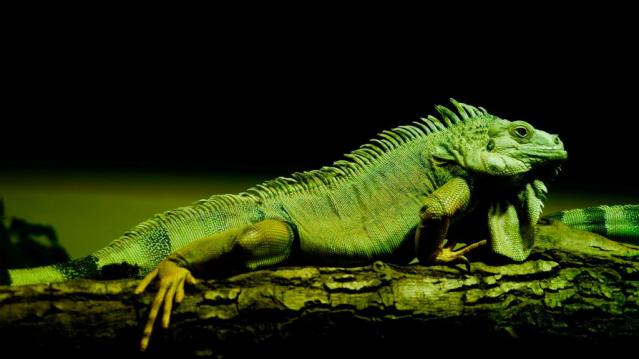Are Iguanas Native to Florida? Florida’s diverse ecosystem is home to a wide array of wildlife, including various reptile species. One reptile that has become increasingly common in the Sunshine State is the iguana. However, the question arises: Are iguanas native to Florida?
In this detailed informational blog, we will delve into the origins of iguanas, their presence in Florida, and whether they can be considered a native species.
Understanding Iguanas:

Iguanas are large, herbivorous lizards belonging to the family Iguanidae. They are native to the tropical regions of Central and South America, where they inhabit a range of habitats, including rainforests, savannas, and coastal areas.
Iguanas are well-known for their distinct appearance, including a spiny crest, long tail, and vibrant coloration.
The Presence of Iguanas in Florida:

While iguanas are not native to Florida, they have established thriving populations in certain regions of the state. The first documented sightings of iguanas in Florida date back to the 1960s, likely as a result of intentional or accidental releases by pet owners.
Over the years, their population has expanded, primarily in South Florida, including areas such as Miami-Dade, Broward, and Palm Beach counties.
You can also read: Why Do Cats Knead?
Non-Native Status of Iguanas:

Iguanas are considered non-native or invasive species in Florida. Native species are those that have naturally inhabited an area without human intervention. In contrast, non-native species are introduced to an area either intentionally or unintentionally by human activities.
As iguanas were introduced to Florida by human actions, they do not meet the criteria to be considered native.
Factors Contributing to Iguana Establishment:
Several factors have contributed to the successful establishment of iguanas in Florida. These include the state’s favorable climate, abundant food sources, and lack of natural predators.
The warm and subtropical climate of Florida provides suitable conditions for iguanas to thrive and reproduce.
Impact on Florida’s Ecosystem:

The presence of iguanas in Florida has raised concerns about their potential impact on the state’s ecosystem. Iguanas are herbivorous and can consume a variety of plant matter, including leaves, flowers, and fruits.
Their feeding habits can lead to damage to native vegetation and compete with native herbivores for food resources.
Control Measures:
To manage the population of iguanas and mitigate their impact, various control measures have been implemented in Florida. These measures include trapping and removal programs, public education on responsible pet ownership, and regulations on the import and sale of iguanas as pets.
Responsible Pet Ownership:
One crucial aspect of addressing the iguana issue in Florida is promoting responsible pet ownership.
Discouraging the release of pet iguanas into the wild and educating owners about the potential consequences can help prevent the establishment of new populations and reduce the impact on native ecosystems.
FAQ Related to Are Iguanas Native to Florida?
Are iguanas native to Florida?
No, iguanas are not native to Florida. They are indigenous to the tropical regions of Central and South America.
How did iguanas end up in Florida?
Iguanas were introduced to Florida through intentional or accidental releases by pet owners. The first documented sightings of iguanas in Florida date back to the 1960s.
Where in Florida can iguanas be found?
Iguanas are primarily found in South Florida, including areas such as Miami-Dade, Broward, and Palm Beach counties. However, their presence is not limited to these regions.
Why are iguanas considered non-native?
Iguanas are considered non-native because they were introduced to Florida by human actions rather than naturally occurring in the area.
What factors have contributed to the establishment of iguanas in Florida?
The warm and subtropical climate of Florida, abundant food sources, and a lack of natural predators have contributed to the successful establishment of iguanas in the state.
Do iguanas pose a threat to Florida’s ecosystem?
Yes, iguanas can impact Florida’s ecosystem. Their herbivorous feeding habits can cause damage to native vegetation, and they may compete with native herbivores for food resources.
What control measures are in place for managing the iguana population?
Various control measures have been implemented in Florida, including trapping and removal programs, public education on responsible pet ownership, and regulations on the import and sale of iguanas as pets.
How can responsible pet ownership help address the iguana issue?
Promoting responsible pet ownership discourages the release of pet iguanas into the wild. Educating owners about the potential consequences helps prevent the establishment of new populations and reduces the impact on native ecosystems.
Iguanas are not native to Florida but have established populations in the state. Their presence raises concerns about the impact on the ecosystem.
By understanding their non-native status, implementing control measures, and promoting responsible pet ownership, Florida can work towards managing the iguana population and protecting its native flora and fauna.
Conclusion:
While iguanas have become a familiar sight in certain parts of Florida, they are not native to the state. Introduced through human actions, iguanas have successfully established populations and raised concerns about their impact on the local ecosystem.
By implementing control measures and promoting responsible pet ownership, Florida can work towards managing the iguana population and protecting its native flora and fauna.
- The family believed they had adopted a “dog,” but the veterinarian calls the police when he notices it.
- When the dog is returned to the shelter for the eleventh time, the staff realises what is happening.
- Equines destined for slaughter are given a chance at a happy life via Gentle Giants Draft Horse Rescue.
- Austin: A Gipsy Vanner Horse of the Highest Originality
- Gentle Carousel Mini Therapy Horses Work Their Magic To Brighten People’s Day
- Unveiling the Rare and Endangered “Marble Horse of France”







6 thoughts on “Are Iguanas Native to Florida? Exploring the Native Status of Iguanas”
Comments are closed.